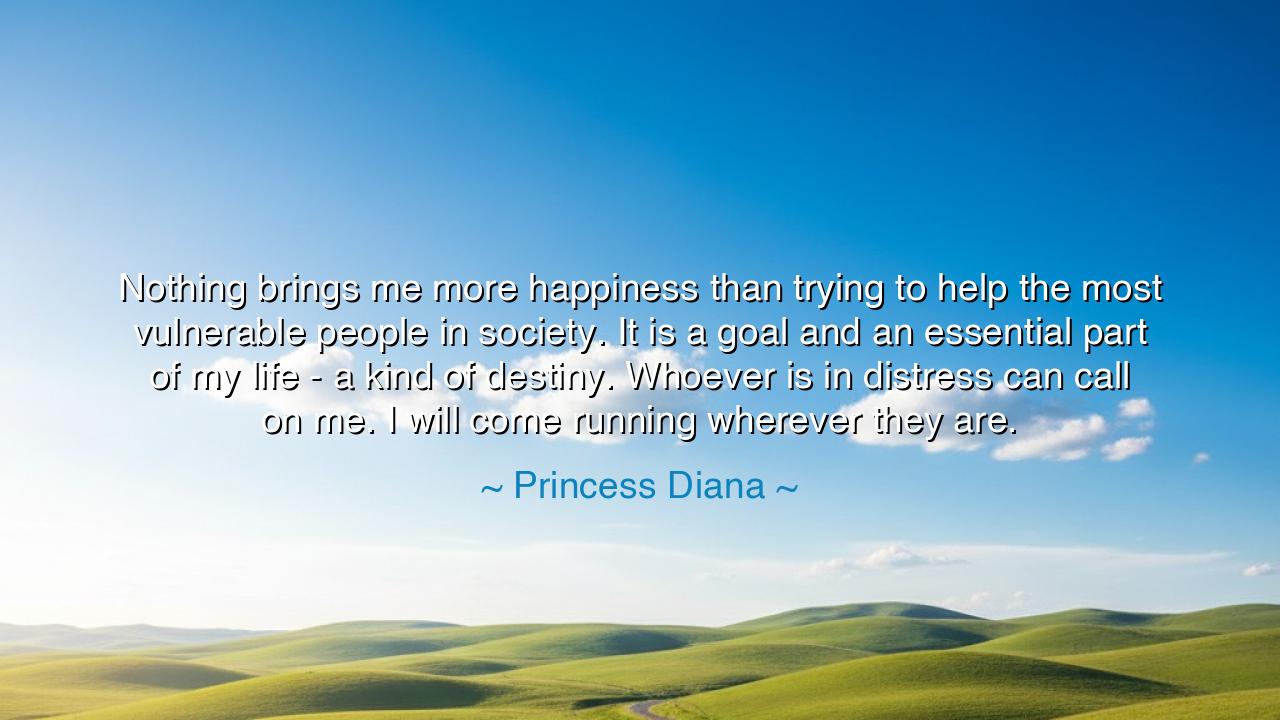
Nothing brings me more happiness than trying to help the most
Nothing brings me more happiness than trying to help the most vulnerable people in society. It is a goal and an essential part of my life - a kind of destiny. Whoever is in distress can call on me. I will come running wherever they are.






"Nothing brings me more happiness than trying to help the most vulnerable people in society. It is a goal and an essential part of my life—a kind of destiny. Whoever is in distress can call on me. I will come running wherever they are." Thus spoke Princess Diana, known to the world not merely as royalty, but as a servant of compassion, a light that burned with love for those the world had forgotten. Her words are a sacred vow—an echo of the eternal truth that happiness does not dwell in palaces or crowns, but in the giving of oneself to others. In them we hear the heartbeat of humanity itself: the call to serve, to heal, and to love without condition.
From the beginning of time, the great souls of history have known this secret: that joy is born not of possession, but of purpose. Princess Diana’s life, though adorned in splendor, was marked by sorrow and struggle. Yet, through the pain, she found her destiny in kindness. While others sought power, she sought the powerless. While others guarded their titles, she gave away her heart. To her, helping the vulnerable was not duty, but destiny—something written not in law, but in spirit. In the modern age, she became a living embodiment of the ancient virtue the Greeks called agape—the selfless love that uplifts the suffering and gives strength to the weak.
The origin of these words lies in the life she chose to live, not the one she inherited. Princess Diana walked among the sick, touched those shunned by society, and held the hands of the dying. When others feared the AIDS epidemic, she sat beside patients and embraced them without hesitation, showing the world that compassion is stronger than ignorance. When landmines shattered the lives of children in faraway nations, she walked through minefields herself, not as a symbol, but as a promise—that no human being is too distant to deserve love. These acts were not gestures for the world’s applause; they were the language of her soul.
Such courage and tenderness call to mind the saints and heroes of old. Like Florence Nightingale, who walked among the wounded soldiers in the dark hours of war, Diana carried her lamp of compassion into the hidden corners of human suffering. She was the princess who stepped off her throne to walk barefoot beside the broken. Her life was not perfect, but in her imperfection lay her beauty—for she showed that one need not be flawless to do good, only willing. Hers was not a reign of power, but of heart, and the echoes of that reign still move the conscience of the world.
The wisdom in her words is this: that happiness is not found in receiving love, but in giving it freely. Many seek joy in comfort, wealth, or fame, yet find only emptiness. But the one who bends down to lift another rises higher in spirit than any throne can offer. To live as Diana lived—to come running when others are in distress—is to live with divine purpose. For when we answer the cry of another, we answer the deepest call of our own soul.
Let it be known, then, that the path of compassion is not reserved for royalty or saints; it is the heritage of all humankind. Each of us has the power to bring light to another’s darkness, to listen, to comfort, to act. Whether through a kind word, a helping hand, or a moment of presence, we can follow the same destiny Diana embraced. When someone near you suffers, do not turn away. When the world grows cold, be the warmth that restores it.
So, my children of tomorrow, remember her lesson: that true happiness is not in being served, but in serving. Seek not the fleeting praise of the world, but the silent joy that blooms in the heart when you ease another’s pain. For in compassion lies strength; in service, purpose; and in love, the immortality of the soul. Princess Diana’s words live on not because they were spoken by a princess, but because they were lived by a human being who understood the oldest truth of all—that to help the vulnerable is to walk in the footsteps of the divine. And when you, too, choose to answer the call of those in need, you will find—as she did—that there is no greater happiness than this.






AAdministratorAdministrator
Welcome, honored guests. Please leave a comment, we will respond soon